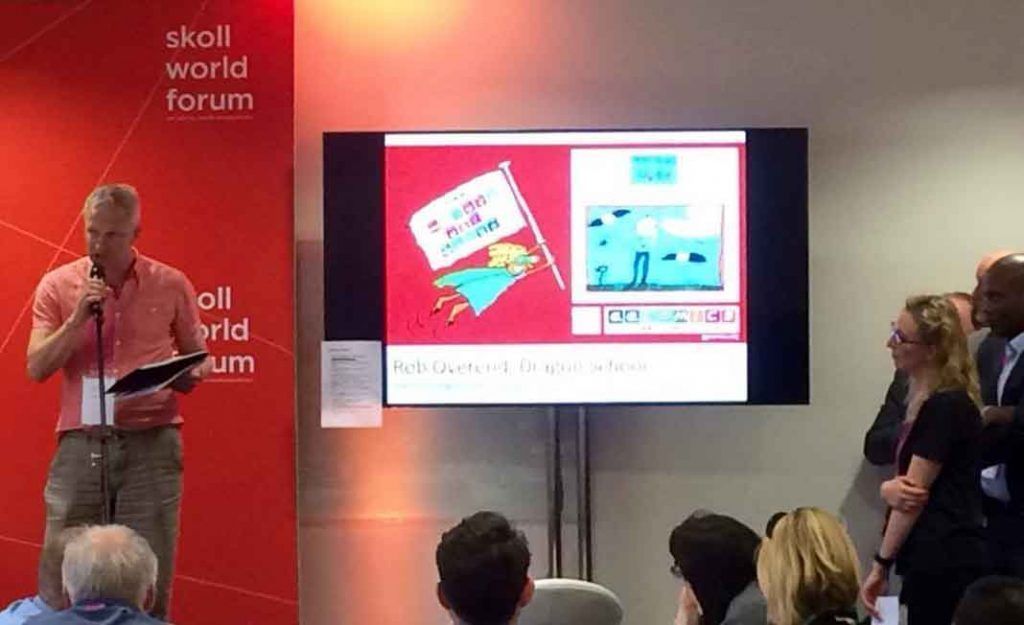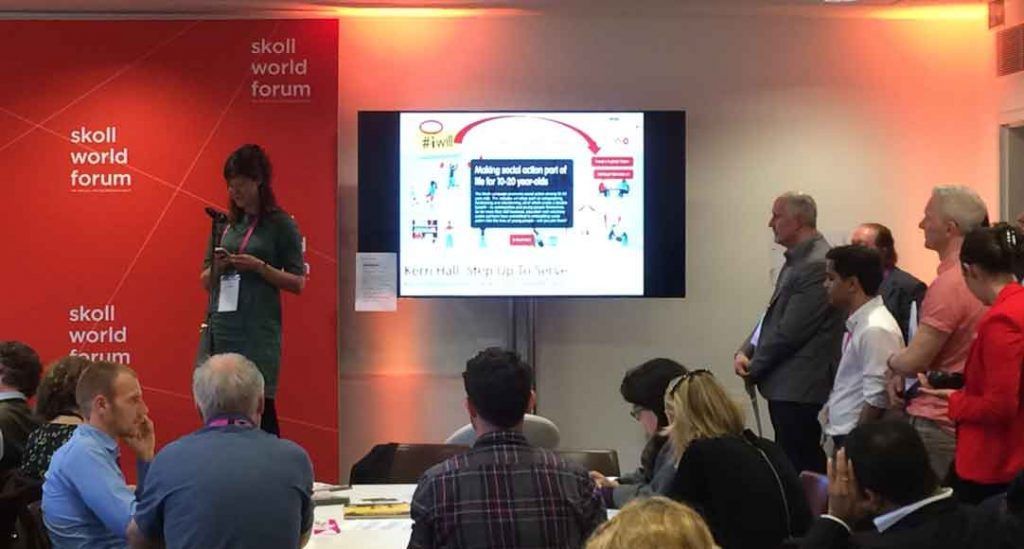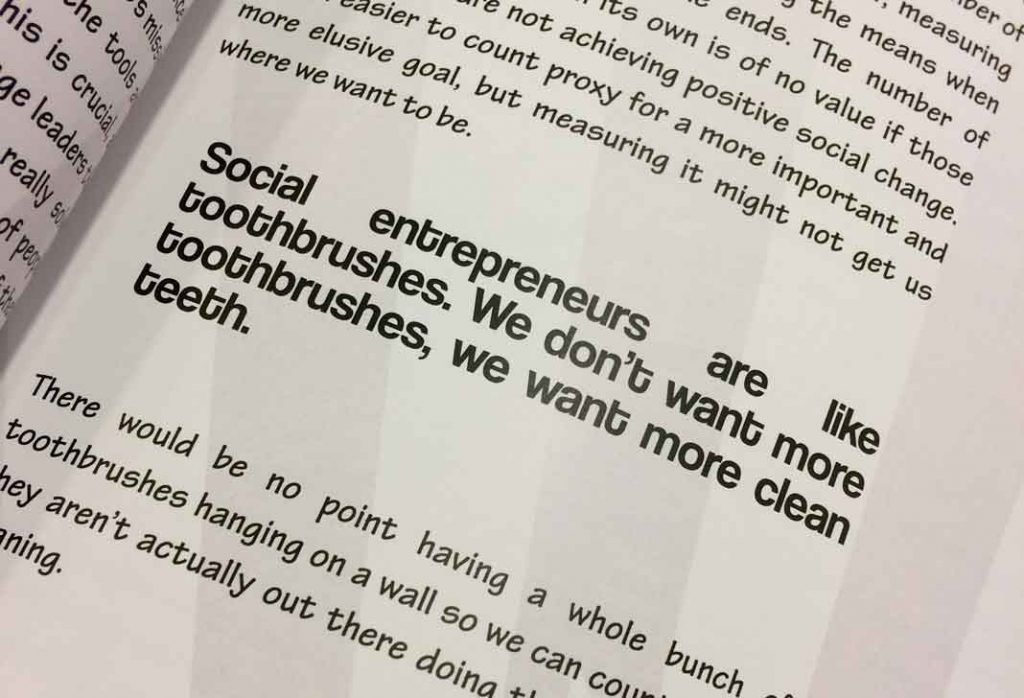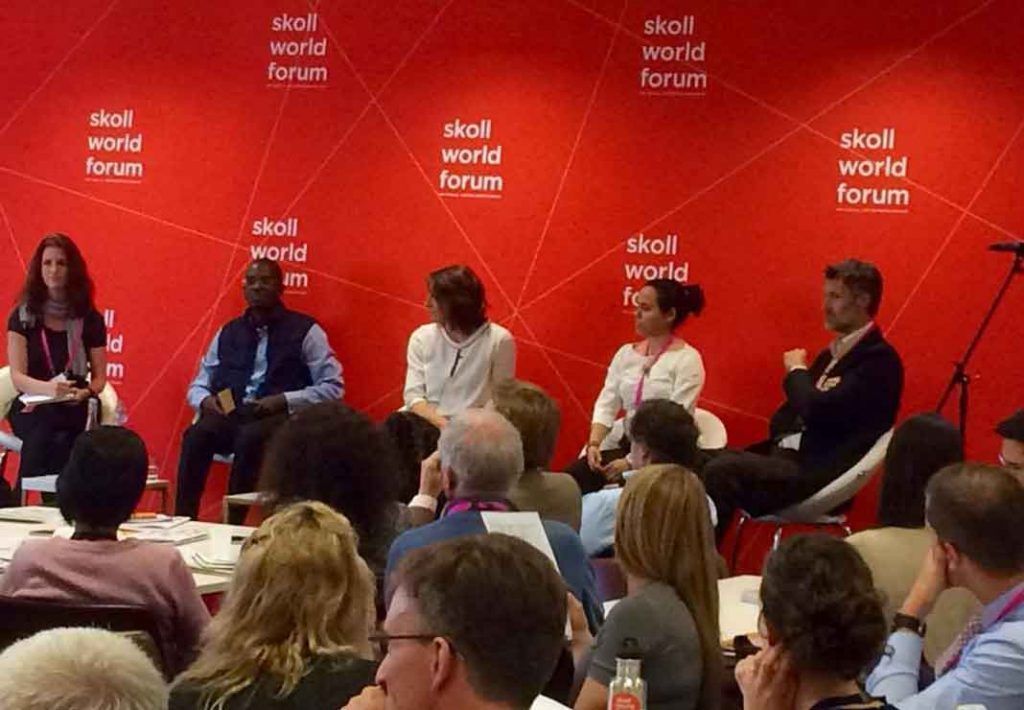April 10, 2017
By Tahirih Danesh
During an unusually sunny week in Oxford, the prestigious Said Business School hosted the 13th Skoll World Forum. Organized by Skoll Foundation, a Palo Alto-based private entity, the Forum spotlights the Foundation’s mission to explore and advance large scale positive social change through pioneering approaches to entrepreneurship.
The Foundation maintains an educational hub, its Centre for Social Entrepreneurship at Oxford University, the site of its annual Forum. Founded by eBay’s first employee and president, Jeff Skoll, the Skoll initiatives help connect social entrepreneurs, funders and partners working in media, the corporate world, governments and the third sector.

Skoll’s Emerging Leaders Initiative in association with Master Card Foundation, awardees and participants at its 4-7 April 2017 Forum “Fault Lines: Creating Common Ground”, including a significant number from global south countries, tackled challenges ranging from poverty alleviation to data models. In anticipation of this high power annual Forum, Skoll partners with other significant entities including TED, Aspen Institute, and the African Leadership.
“You only need so much for you and your family.” Jeff Skoll
The annual World Forum highlights significant contributions by renowned figures who engage in imaginative ways to channel resources to world-embracing challenges. Among others this year, Skoll recognized U2 singer, Bono, with its Skoll Global Treasure Award. In addition to ONE and Red that have helped raise millions to help those most in need, Bono has helped establish Rise, the largest social impact fund involving notable innovators turned social investors, including part Iranian billionaire, Pierre Omidyar.
“Corruption lives in the region between declared amounts of money and the real amounts of money that are paid.” Bono (U2)
Social impact funds result in a range of success rates. The key challenge in increasing chances of success is that positive social change must be measurable. This is particularly crucial at this time of great economic shifts. After all, if financial gain and doing good can go hand in hand, then the tottering world of finance may have found the panacea it needs to survive the tsunami of economic challenges that threaten its system at an unprecedented scale.
In a world where we have grown accustomed to accumulate monstrous amounts of wealth through the corporate sector and hand out pennies through the third sector to feel good, the gap between the privileged and the poor is becoming dangerously wide. In countries like Iran, Afghanistan, or Tajikstan, where we share linguistic ties and social challenges, the deepening gap yields a greater negative impact on the younger generations everywhere. Unable to afford the most elementary needs for an ordinary life in Mosul or Manhattan, an increasing percentage face economic, social or political systems that rely on burdening them with competition and corruption. The question remains how do we go about changing these systems?
While many argue in favour of social investment schemes that help entrepreneurs guide the younger generation through an eventful chapter in human history, others like Bono find that the investment schemes serve as yet another means for “a lot of bad deals done by good people” against those most in need. While Bono, Jeff Skoll, Omidyar and other privileged few experiment with different investment schemes in the short term, what will safeguard the culture of change that Skoll connoisseurs are working towards?
While the Forum offered insightful exchanges on a number of hot topics such as the environment or immigration, arguably the pivotal system urgently in need of attention, appears to be that of education. Presenters and panelists at some of the most popular sessions argued that every other system, including that of entrepreneurship, depends on our education system, the largest and most universal system that envelopes the planet. Suffering from “a deficit in systematic thinking and collaboration” according to Ross Hall, the Director of Ashoka, the education system needs to respond to the fact that we share far more than not. That in a post-truth world young minds must be trained to investigate, collaborate and innovate through a sound grasp of “scientific method, philosophy, mindfulness and reason” said Sebastien Turbot of WISE. That even the most acclaimed institutions of learning fail to adequately inculcate necessary skills such as the art of deep and meaningful conversation, a truly interdisciplinary approach to learning, or how “lived experience creates the expertise,” as argued by Teach For All CEO Wendy Kopp.
In fact one may go as far as suggesting the key to the survival of each and everyone of us is education. Some of those most active in the field of education argue that education must account for differences in learner’s talent, it must focus more on soft skill development and help individuals develop the capacity to inject fresh and constructive perspectives into our community based on global perception and local participation.
They also pointed out that across the board demands for a better educational system are similar if not the same. However, we lack the tools to consult, collaborate and coordinate an appropriate, holistic and universal response. And then there is the business aspect of education, where economic interests of a few dictate access for all.
“Education is far too important for us to leave it to just educators.” Skoll Forum Delegate
Others referred to the sad reality of competition that afflicts education more than the corporate world. Others spoke of the manner in which we continue to ignore calls to action by some of the greatest experts in education such as Sir Ken Robinson, not realizing our failing economies are directly affected by our dying education system. That the gap between those who can and cannot access quality education is widening. That while paying lip service to the imperative task of reimagining education system occupies the privileged, we expend our wealth and young at the mercy of age old educational institutions that can at best accommodate a few. That the majority are denied access to adequate education, face dismal chances of employability and increasingly immigrate in the hope of living a better life.
The good news is that thousands of grassroots initiatives are taking up the challenge. Despite difficulties and deficits of all sorts, visionary youth, women and men everywhere are writing curricula, starting community schools, new universities, and increasingly working to unite our narrative in response to this urgent need. Although they may lack the brand of age old institutions, they provide what the future generations need to survive rising challenges. These initiatives teach ‘how’ to access rather than ‘what’ information to access. They teach how to learn, help develop the capacity to synthesise new ideas, consult and collaborate, develop goals and plans, research and document, and thanks to our most important accomplishment in the Twentieth Century, the internet, imagine new ways and means of bringing about change.
“We need to embed a reflective practice into our daily operation as we challenge ourselves to continually find better ways of co-creating social value.” Dr. Francois Bonnici
Established institutions are following suit. They must if they want to survive this titanic shift. And 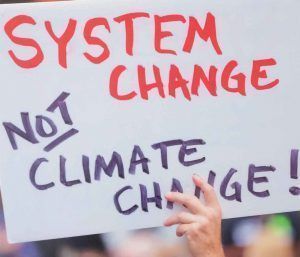 they are, one cautious step at a time. Take Coursera for example, where accessing world class education by the likes of Duke, Stanford and Yale, is no longer a luxury good for the richest and the fittest. But more is needed. Much of the new initiatives are limited to those that speak English or are familiar with a Western style of education. Furthermore, out of the 17-billion-dollar education funds available to new initiatives, not a dollar goes towards learning from each other at the local level. But experience shows the only way to succeed is to build a process from the bottom up. This is how humanity has established any process that is universal and sustainable.
they are, one cautious step at a time. Take Coursera for example, where accessing world class education by the likes of Duke, Stanford and Yale, is no longer a luxury good for the richest and the fittest. But more is needed. Much of the new initiatives are limited to those that speak English or are familiar with a Western style of education. Furthermore, out of the 17-billion-dollar education funds available to new initiatives, not a dollar goes towards learning from each other at the local level. But experience shows the only way to succeed is to build a process from the bottom up. This is how humanity has established any process that is universal and sustainable.
The world is far too populated to allow the fittest few to survive. We need universal education. We need to own the process of changing our education system. We need to reinvent our systems. It is a long-term process with massive short term implications. But we must rise up. And to do so, we first need to reflect on the reality that we can no longer accommodate the survival of just the fittest. We all have the right to survive. To do so, day by day, step by step, each and every one of us, must engage in reimagining the most important system of all: education.
Bio
Tahirih Danesh is the Executive Director of Persia Educational Foundation, a UK-based charity looking at advancing education by, for and among women and children of Persian-speaking communities worldwide. To learn more about Persia, please see: www.persia.education


